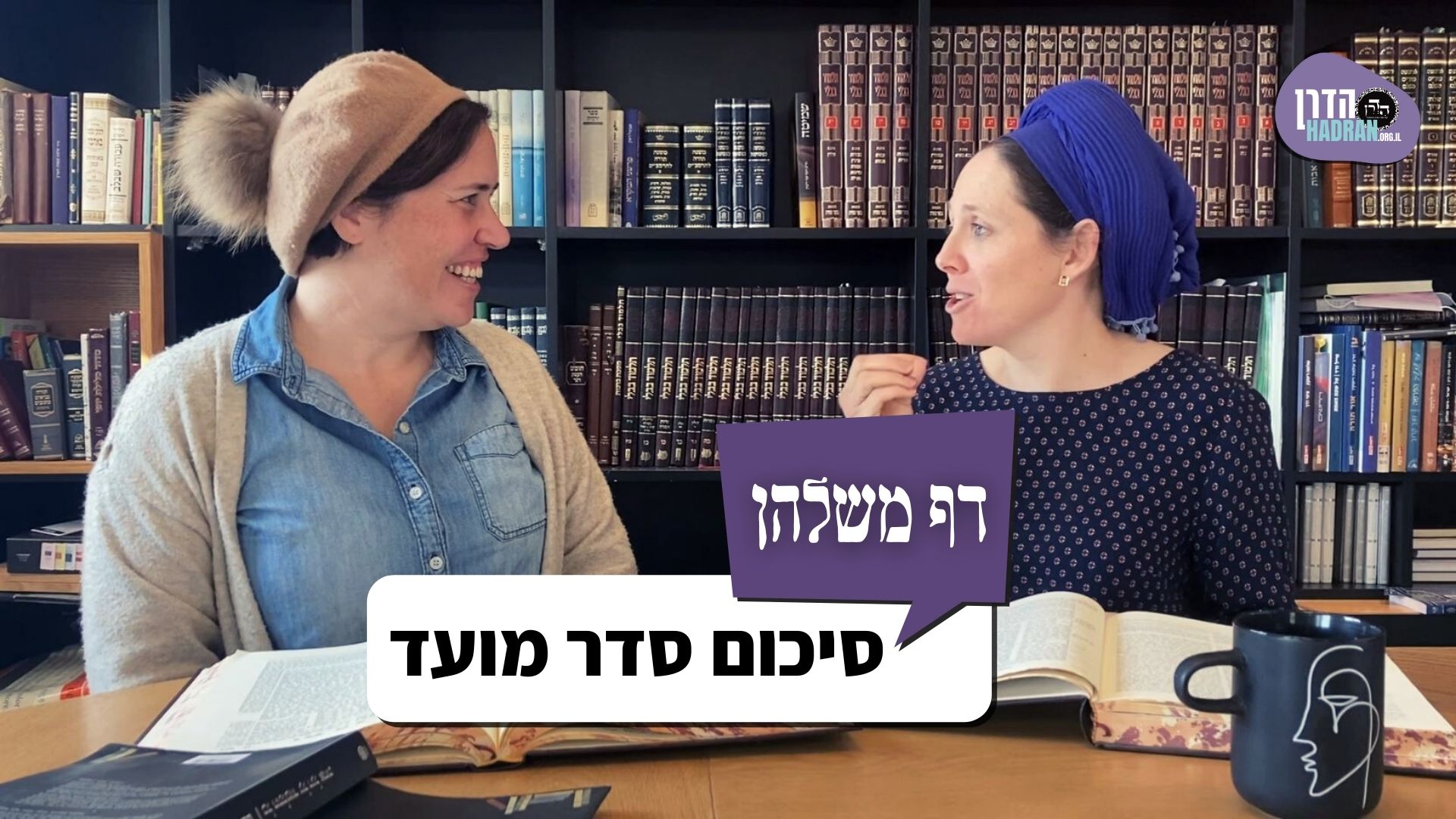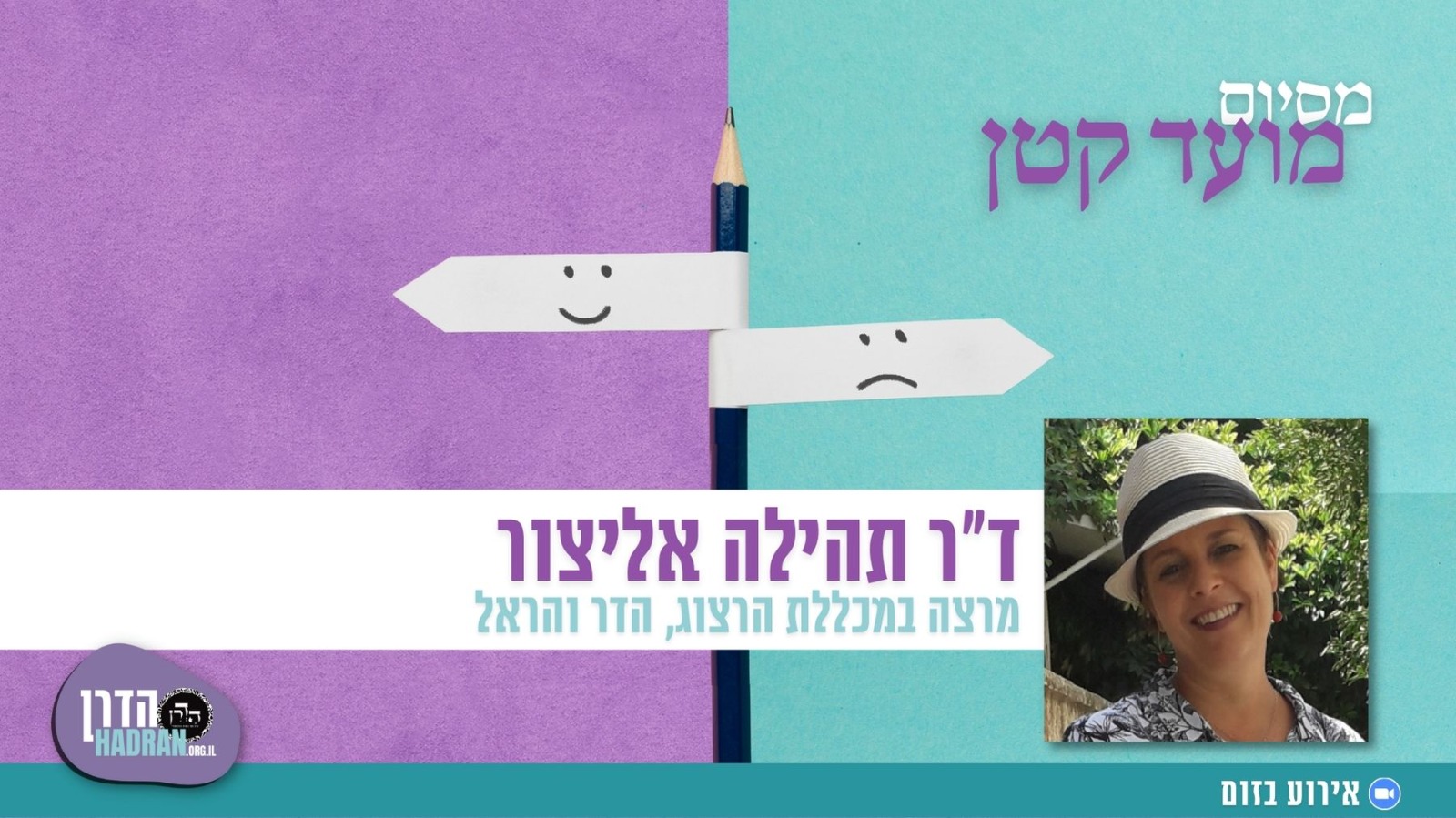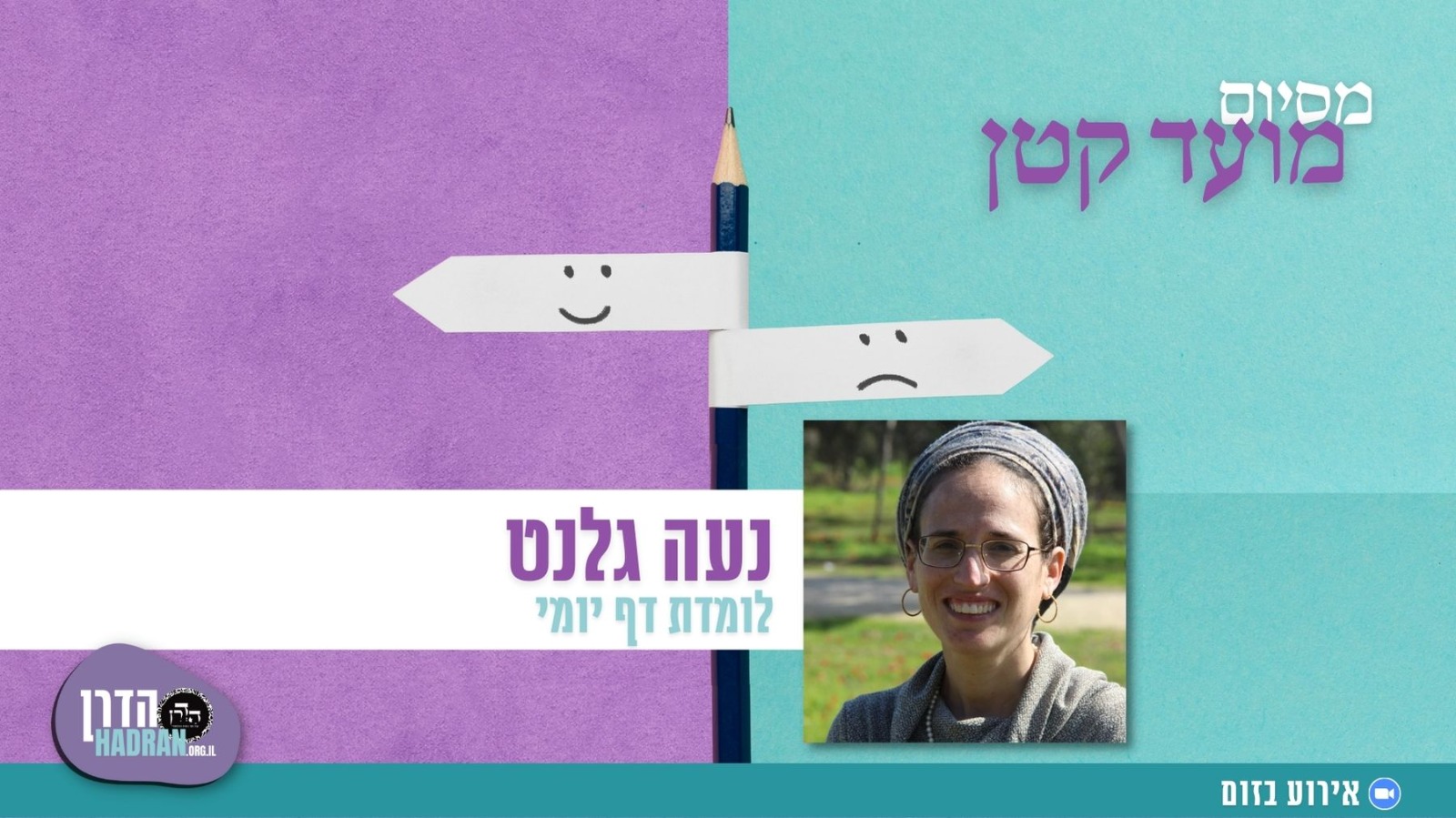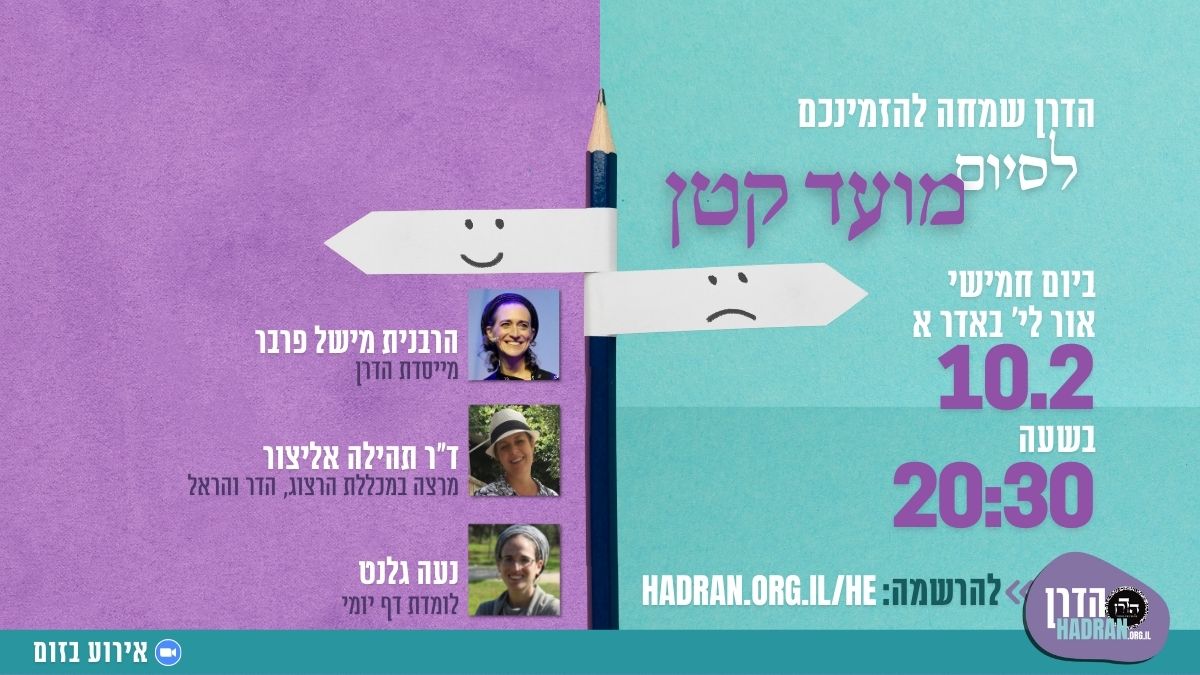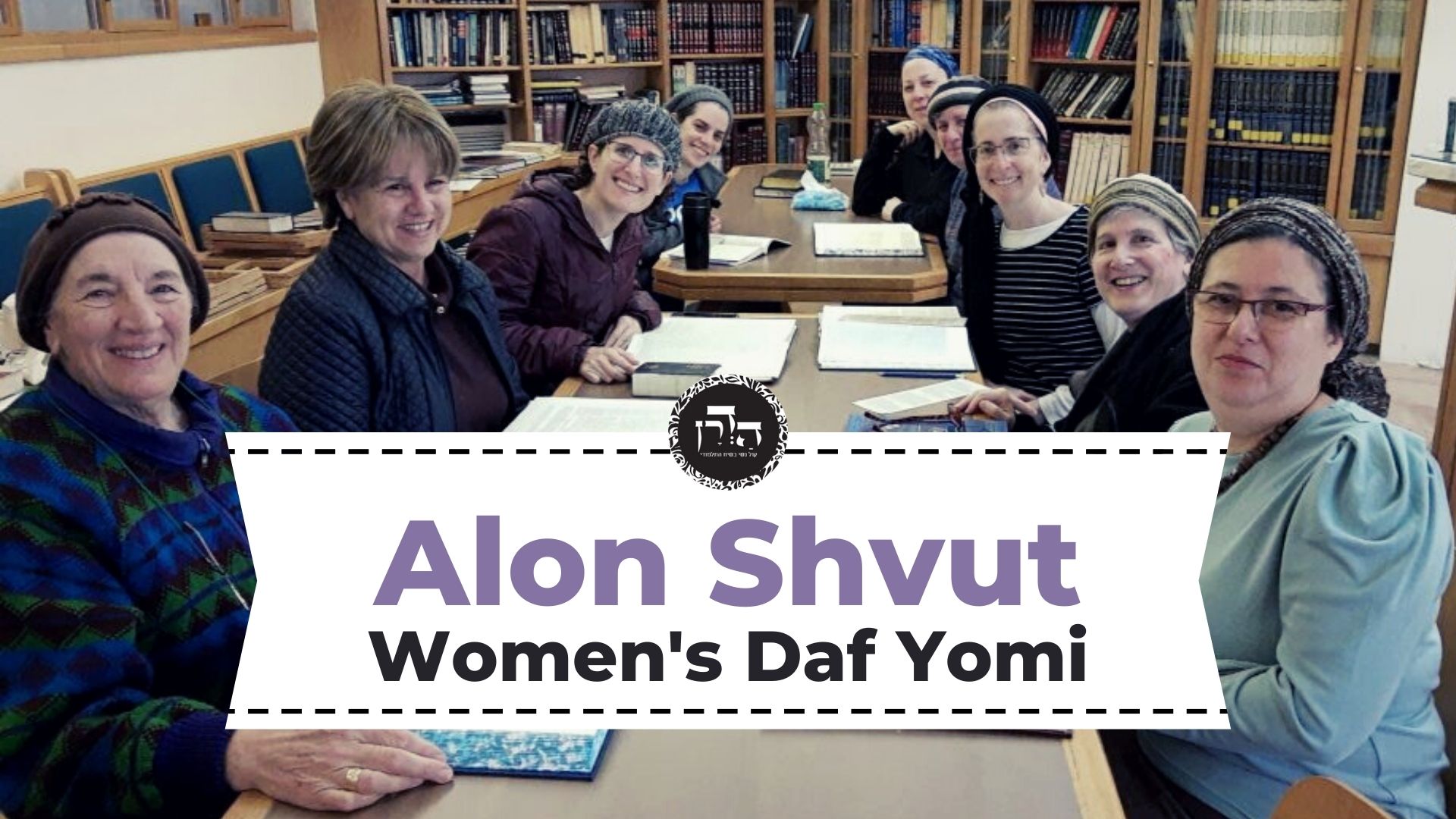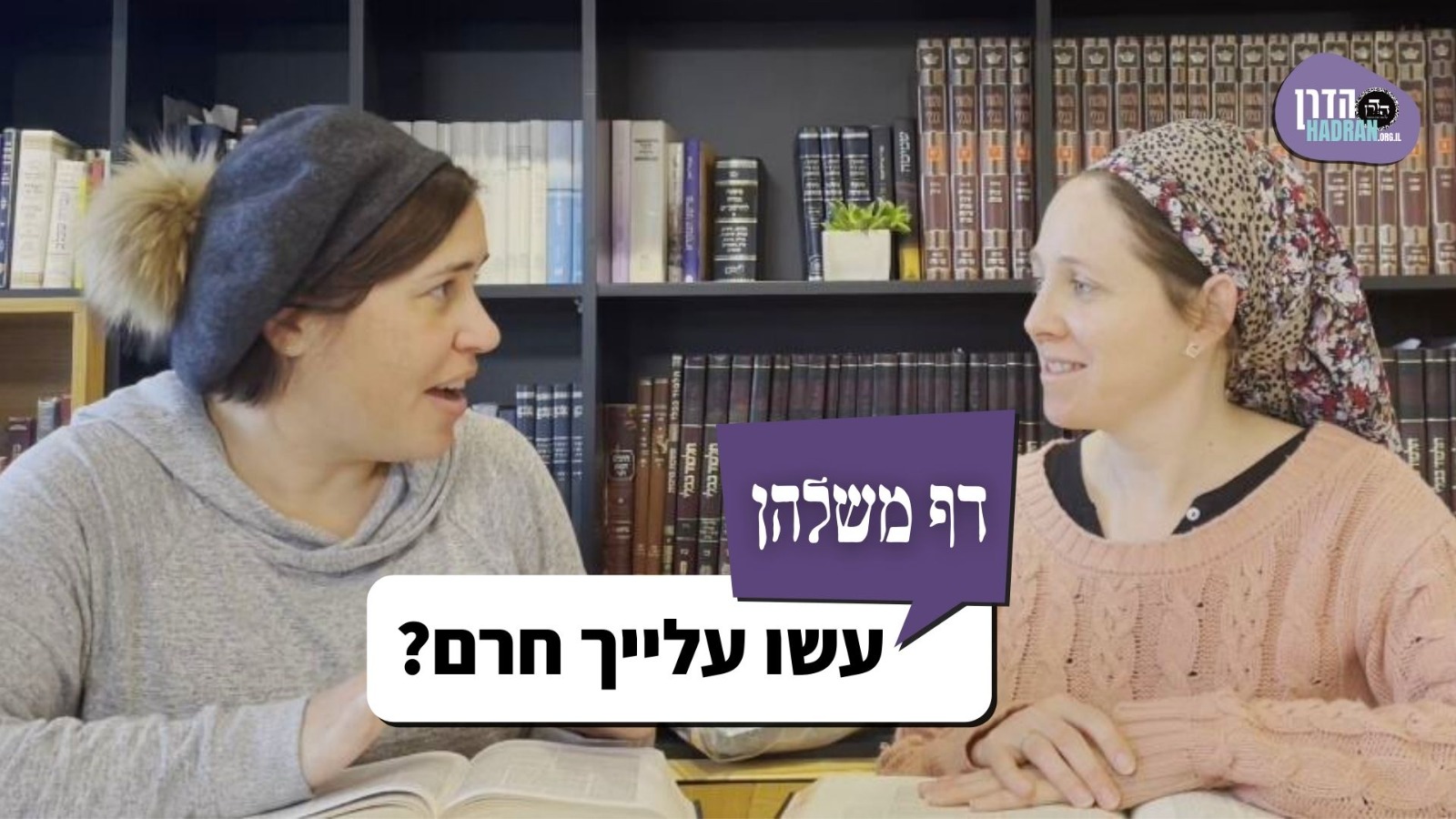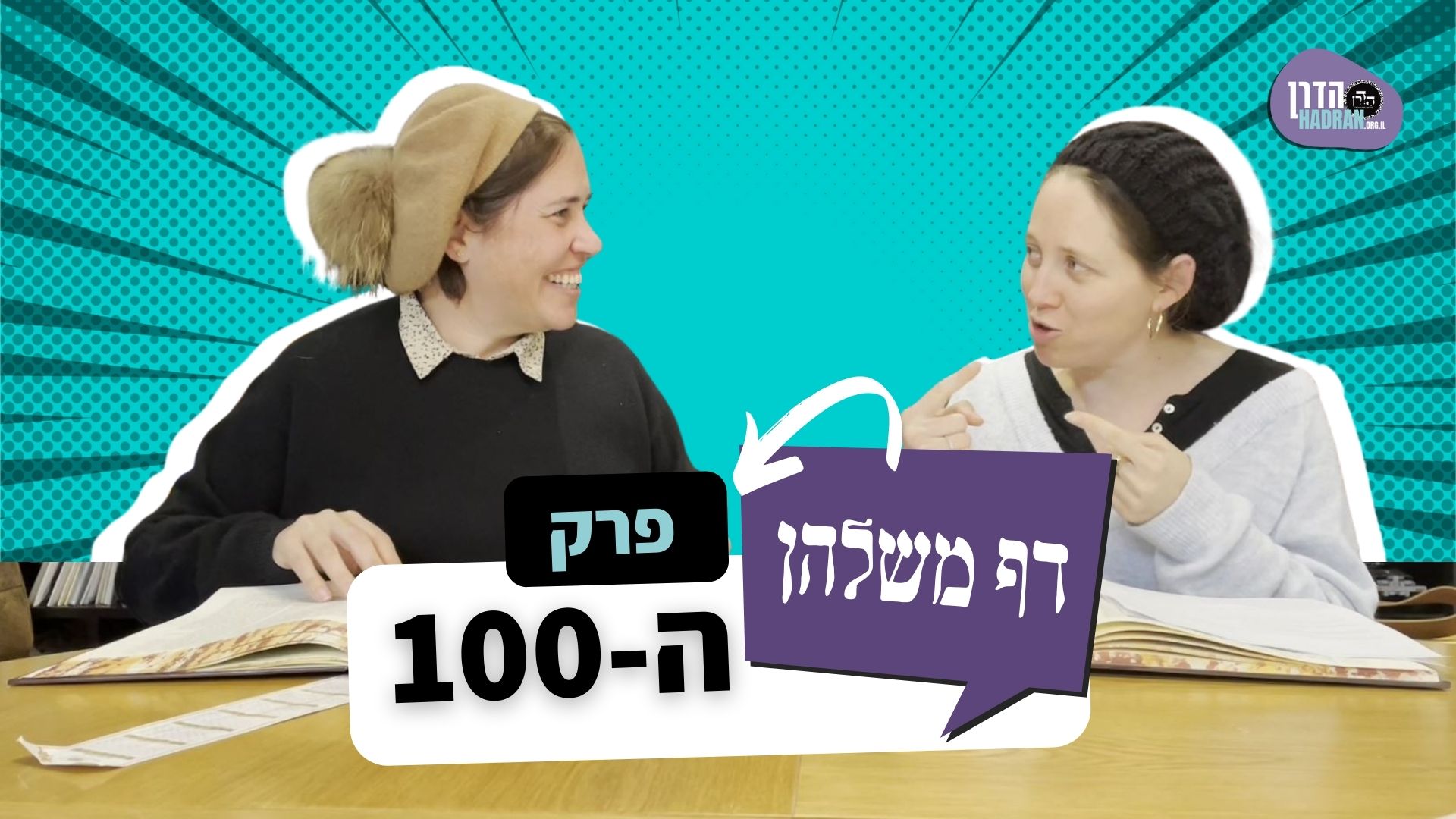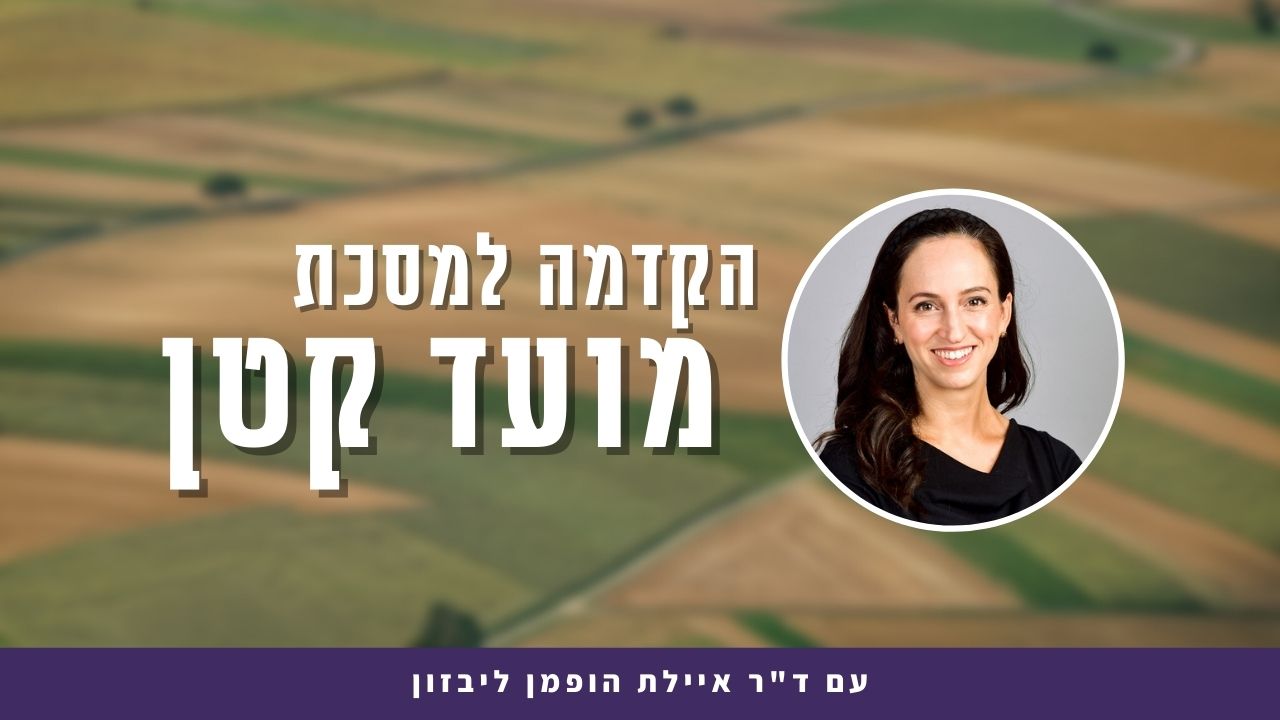מועד קטן ג
תּוֹלָדוֹת לָא אָסַר רַחֲמָנָא. דִּכְתִיב: ״וּבַשָּׁנָה הַשְּׁבִיעִית שַׁבַּת שַׁבָּתוֹן יִהְיֶה לָאָרֶץ שָׂדְךָ לֹא תִזְרָע וְגוֹ׳״.
whereas the subcategories of labor that are derived from them, e.g., watering, were not prohibited by the Merciful One, i.e., by Torah law, but only by rabbinic law; and in a case of loss the Sages were lenient. The source for this distinction is as it is written: “But in the seventh year shall be a sabbath of solemn rest for the land, a sabbath for the Lord: Your field you shall not sow, and your vineyard you shall not prune. That which grows of its own accord of your harvest you shall not reap, nor gather the grapes of your undressed vines” (Leviticus 25:4–5).
מִכְּדֵי, זְמִירָה בִּכְלַל זְרִיעָה, וּבְצִירָה בִּכְלַל קְצִירָה. לְמַאי הִלְכְתָא כַּתְבִינְהוּ רַחֲמָנָא?
Since pruning is included in the principal category of sowing, as its objective is to encourage the plant’s growth, and picking grapes is included in the principal category of reaping grain, as both involve removal of produce from a plant, for the purpose of teaching what halakha did the Merciful One write them? Why did the Torah explicitly prohibit pruning and picking grapes, rather than sufficing with the general prohibitions against sowing and reaping?
לְמֵימְרָא דְּאַהָנֵי תּוֹלָדוֹת מִיחַיַּיב, אַאַחְרָנְיָיתָא לָא מִיחַיַּיב.
The Gemara answers that these were individually enumerated to say that only for these subcategories of labor is one liable to be flogged, while for other subcategories of labor, i.e., watering a field, one is not liable. Consequently, there are only four types of labor that are prohibited by Torah law during the Sabbatical Year: Sowing and its subcategory of pruning, as well as reaping and its subcategory of grape picking. All other subcategories of labor are prohibited only by rabbinic decree.
וְלָא? וְהָתַנְיָא: ״שָׂדְךָ לֹא תִזְרַע וְכַרְמְךָ לֹא תִזְמוֹר״. אֵין לִי אֶלָּא זֵירוּעַ וְזִימּוּר, מִנַּיִן לְנִיכּוּשׁ וּלְעִידּוּר וּלְכִיסּוּחַ — תַּלְמוּד לוֹמַר: ״שָׂדְךָ לֹא״, ״כַּרְמְךָ לֹא״. לֹא כׇּל מְלָאכָה שֶׁבְּשָׂדְךָ, וְלֹא כׇּל מְלָאכָה שֶׁבְּכַרְמְךָ.
The Gemara asks: And is there really no liability for other subcategories of labor? Isn’t it taught in a baraita: “Your field you shall not sow, and your vineyard you shall not prune” (Leviticus 25:4). I have derived from here an explicit prohibition only against sowing and pruning. From where do I derive that weeding, i.e., uprooting weeds, hoeing, and cutting weeds, even without uprooting them, are also prohibited? The verse states: “Your field you shall not sow” and “your vineyard you shall not prune.” This wording indicates that no labor may be performed in your field, and no labor may be performed in your vineyard.
מִנַּיִן שֶׁאֵין מְקַרְסְמִין וְאֵין מְזָרְדִין וְאֵין מְפַסְּגִין בָּאִילָן? תַּלְמוּד לוֹמַר: ״שָׂדְךָ לֹא״, ״כַּרְמְךָ לֹא״. לֹא כׇּל מְלָאכָה שֶׁבְּשָׂדְךָ, וְלֹא כׇּל מְלָאכָה שֶׁבְּכַרְמְךָ.
Similarly, from where is it derived that one may not prune trees, and one may not trim dry branches from trees, and one may not cut large branches [mefasegin] from trees? The verse states: “Your field you shall not sow” and “your vineyard you shall not prune,” thereby teaching that no labor may be performed in your field, and no labor may be performed in your vineyard.
מִנַּיִן שֶׁאֵין מְזַבְּלִין וְאֵין מְפָרְקִין וְאֵין מְאַבְּקִין וְאֵין מְעַשְּׁנִין בָּאִילָן? תַּלְמוּד לוֹמַר: ״שָׂדְךָ לֹא״, ״כַּרְמְךָ לֹא״. כׇּל מְלָאכָה שֶׁבְּשָׂדְךָ לֹא, וְכׇל מְלָאכָה שֶׁבְּכַרְמְךָ לֹא.
Similarly, from where is it derived that one may not fertilize fields and vineyards, and one may not remove stones that surround the base of a tree and impede its growth, and one may not cover exposed roots with dust, and one may not fumigate a tree in order to exterminate worms? The verse states: “Your field you shall not sow” and “your vineyard you shall not prune,” thereby indicating that no labor may be performed in your field, and no labor may be performed in your vineyard.
יָכוֹל לֹא יְקַשְׁקֵשׁ תַּחַת הַזֵּיתִים, וְלֹא יְעַדֵּר תַּחַת הַגְּפָנִים, וְלֹא יְמַלֵּא נְקָעִים מַיִם, וְלֹא יַעֲשֶׂה עוּגִיּוֹת לַגְּפָנִים — תַּלְמוּד לוֹמַר: ״שָׂדְךָ לֹא תִזְרָע״.
The apparent conclusion from this is that all labor in a field or a vineyard is prohibited. One might have thought that one may also not hoe lightly under olive trees and one may not hoe under grapevines, and one may not fill cracks in the ground with water, and one may not construct circular ditches around the bases of grapevines in order to collect rainwater. Therefore, the verse states: “Your field you shall not sow.”
זְרִיעָה בַּכְּלָל הָיְתָה, וְלָמָּה יָצְתָה — לְהַקִּישׁ אֵלֶיהָ, לוֹמַר לְךָ: מָה זְרִיעָה מְיוּחֶדֶת עֲבוֹדָה שֶׁבַּשָּׂדֶה וְשֶׁבַּכֶּרֶם, אַף כֹּל שֶׁהִיא עֲבוֹדָה שֶׁבַּשָּׂדֶה וְשֶׁבַּכֶּרֶם!
The Gemara explains the derivation: Sowing was included in the general prohibition against performing agricultural labors during the Sabbatical Year, as the verse states “But in the seventh year shall be a sabbath of solemn rest for the land” (Leviticus 25:4). Why was sowing singled out and mentioned explicitly? In order to compare other types of labor to it and to say to you: Just as sowing is unique in that it is labor performed both in the field and in the vineyard, so too, any other labor performed both in the field and in the vineyard is prohibited. However, labors performed only in the vineyard but not in the field, i.e., whose objective is merely to sustain the vines from year to year, such as the labors mentioned above, are permitted. In any case, this baraita indicates that many subcategories of labor are prohibited during the seventh year, and not just sowing and pruning, as Rava had stated.
מִדְּרַבָּנַן, וּקְרָא אַסְמַכְתָּא בְּעָלְמָא.
The Gemara rejects this opinion: These labors, with the exceptions of sowing, pruning, grape picking, and reaping, are all prohibited only by rabbinic law, and the verse that is cited as a source from the Torah is a mere support, and not a bona fide source.
וְקִשְׁקוּשׁ בִּשְׁבִיעִית מִי שְׁרֵי? וְהָא כְּתִיב: ״וְהַשְּׁבִיעִית תִּשְׁמְטֶנָּה וּנְטַשְׁתָּהּ״ — ״תִּשְׁמְטֶנָּה״ מִלְּקַשְׁקֵשׁ, ״וּנְטַשְׁתָּהּ״ מִלְּסַקֵּל!
Incidental to this discussion, the Gemara asks: Is light hoeing under olive trees in fact permitted during the Sabbatical Year? Isn’t it written: “But the seventh year you shall let it rest and lie fallow” (Exodus 23:11), and it is taught with regard to this verse: “You shall let it rest” from light hoeing, “and lie fallow” from clearing the field of stones. This indicates that light hoeing is indeed prohibited during the Sabbatical Year.
אָמַר רַב עוּקְבָא בַּר חָמָא: תְּרֵי קִשְׁקוּשֵׁי הָווּ. חַד אַבְרוֹיֵי אִילָנֵי, וְחַד סַתּוֹמֵי פִּילֵי. אַבְרוֹיֵי אִילָן — אָסוּר, סַתּוֹמֵי פִּילֵי — שְׁרֵי.
Rav Ukva bar Ḥama said: There are two types of light hoeing, one whose objective is to strengthen the trees, and another that is intended to seal cracks. There is a practical halakhic difference between them: Hoeing performed in order to strengthen the tree is prohibited, as it is similar to plowing in that it enhances the tree’s growth. However, hoeing undertaken in order to seal cracks is permitted, as by doing so one prevents damage to the tree.
אִיתְּמַר: הַחוֹרֵשׁ בַּשְּׁבִיעִית, רַבִּי יוֹחָנָן וְרַבִּי אֶלְעָזָר, חַד אָמַר: לוֹקֶה, וְחַד אָמַר: אֵינוֹ לוֹקֶה. לֵימָא בִּדְרַבִּי אָבִין אָמַר רַבִּי אִילְעָא קָמִיפַּלְגִי. דְּאָמַר רַבִּי אָבִין אָמַר רַבִּי אִילְעָא: כׇּל מָקוֹם שֶׁנֶּאֱמַר כְּלָל בַּעֲשֵׂה וּפְרָט בְּלֹא תַעֲשֶׂה — אֵין דָּנִין אוֹתוֹ בִּכְלָל וּפְרָט וּכְלָל.
§ It was stated that Rabbi Yoḥanan and Rabbi Elazar disagreed with regard to one who plows during the Sabbatical Year. One said: He is flogged for doing so, while the other one said: He is not flogged. The Gemara suggests: Let us say that they disagree with regard to the principle that Rabbi Avin said that Rabbi Ile’a said, and one accepts this principle while the other does not. As, Rabbi Avin said that Rabbi Ile’a said: Wherever a generalization is stated in the Torah as a positive mitzva, and a detail relating to that generalization is stated as a negative mitzva, one does not apply the hermeneutical principle of a generalization, and a detail, and a generalization, according to which the halakha under discussion is expanded to all cases that resemble the detail.
מַאן דְּאָמַר לוֹקֶה — לֵית לֵיהּ דְּרַבִּי אָבִין אָמַר רַבִּי אִילְעָא.
The Gemara explains: The one who said that one who plows during the Sabbatical Year is flogged does not accept the principle that Rabbi Avin said that Rabbi Ile’a said. Accordingly, he expounds the verses as follows: The verse “But in the seventh year shall be a sabbath of solemn rest for the land” (Leviticus 25:4) is a generalization stated as a positive mitzva. The continuation of the verse is “Your field you shall not sow,” which is a detail stated as a negative mitzva. This is followed by another generalization: “For it shall be a year of rest for the land” (Leviticus 25:5). By applying the principle of a generalization, a detail, and a generalization, one can derive that there is a prohibition against performing any agricultural task that is similar to sowing, including plowing.
וּמַאן דְּאָמַר אֵינוֹ לוֹקֶה — אִית לֵיהּ דְּרַבִּי אָבִין.
And the one who said that one is not flogged for plowing holds in accordance with the ruling that Rabbi Avin stated in the name of Rabbi Ile’a. Therefore, the prohibition stated as a detail, i.e., the prohibition against sowing, is not extended to include any other labor. One who plows violates the positive command to let the land rest, but does not transgress a Torah law phrased as a negative mitzva, and therefore he is not flogged.
לָא, דְּכוּלֵּי עָלְמָא לֵית לֵיהּ דְּרַבִּי אָבִין אָמַר רַבִּי אִילְעָא, מַאן דְּאָמַר לוֹקֶה — שַׁפִּיר.
The Gemara rejects this suggestion: No, one can say that everyone holds that the halakha is not in accordance with the principle that Rabbi Avin said that Rabbi Ile’a said. According to the one who said he is flogged, all is well, as he applies the hermeneutical principle of a generalization, a detail, and a generalization to derive a prohibition for plowing.
וּמַאן דְּאָמַר אֵינוֹ לוֹקֶה, אָמַר לָךְ: מִכְּדִי זְמִירָה בִּכְלַל זְרִיעָה וּבְצִירָה בִּכְלַל קְצִירָה, לְמַאי הִלְכְתָא כַּתְבִינְהוּ רַחֲמָנָא? לְמֵימַר דְּאַהָנֵי תּוֹלָדוֹת הוּא דְּמִיחַיַּיב, אַתּוֹלָדָה אַחֲרִינָא לָא מִיחַיַּיב.
And the one who said that he is not flogged could have said to you: Since pruning is included in the primary category of sowing, and grape picking is included in the primary category of reaping, for the purpose of teaching what halakha did the Merciful One write them? They were individually enumerated to say that only for these specific subcategories of labor is one liable to be flogged, but for performing other subcategories of labor one is not liable. According to this opinion, the verse comes to teach that one is not liable to be flogged for performing any labor not explicitly enumerated in the Torah, including plowing.
וְלָא? וְהָתַנְיָא: ״שָׂדְךָ לֹא תִזְרַע וְכַרְמְךָ לֹא תִזְמוֹר״, אֵין לִי אֶלָּא זֵירוּעַ וְזִימּוּר. מִנְיָן לְעִידּוּר וּלְקִישְׁקוּשׁ וּלְכִיסּוּחַ? תַּלְמוּד לוֹמַר: ״שָׂדְךָ לֹא״, ״כַּרְמְךָ לֹא״. לֹא כׇּל מְלָאכָה שֶׁבְּשָׂדְךָ וְלֹא כׇּל מְלָאכָה שֶׁבְּכַרְמְךָ.
The Gemara asks: And is there really no liability for other subcategories of labor? Isn’t it taught in a baraita with regard to the verse “Your field you shall not sow, and your vineyard you shall not prune” that I have derived from here an explicit prohibition only against sowing and pruning? From where do I derive that weeding, hoeing, and cutting weeds are also prohibited? The verse states: “Your field you shall not sow and your vineyard you shall not prune” (Leviticus 25:4). By placing the word “not” immediately following the words “field” and “vineyard,” the verse indicates that one may not perform any labor that is generally performed in your field, and one may not perform any labor that is generally performed in your vineyard.
וּמִנַּיִן שֶׁאֵין מְקַרְסְמִין, וְאֵין מְזָרְדִין, וְאֵין מְפַסְּגִין בָּאִילָן תַּלְמוּד לוֹמַר: ״שָׂדְךָ לֹא״, ״כַּרְמְךָ לֹא״: כׇּל מְלָאכָה שֶׁבְּשָׂדְךָ לֹא כׇּל מְלָאכָה שֶׁבְּכַרְמְךָ לֹא.
Similarly, from where is it derived that one may not prune trees, and one may not trim dry branches from trees, and one may not cut large branches from trees? The verse states: “Your field you shall not sow and your vineyard you shall not prune,” indicating that any labor that is generally performed in your field may not be performed during the Sabbatical Year, and any labor generally performed in your vineyard may not be performed during the Sabbatical Year.
מִנַּיִן שֶׁאֵין מְזַבְּלִין וְאֵין מְפָרְקִין וְאֵין מְעַשְּׁנִין בָּאִילָן? תַּלְמוּד לוֹמַר: ״שָׂדְךָ לֹא״, ״כַּרְמְךָ לֹא״. כׇּל מְלָאכָה שֶׁבְּשָׂדְךָ לֹא, וְכׇל מְלָאכָה שֶׁבְּכַרְמְךָ לֹא.
From where is it derived that one may not fertilize fields and vineyards, and one may not remove stones from around the base of a tree that impede its growth, and one may not fumigate a tree in order to exterminate worms? The verse states: “Your field you shall not sow and your vineyard you shall not prune,” thereby indicating that any labor that is generally performed in your field may not be performed during the Sabbatical Year, and any labor generally performed in your vineyard may not be performed during the Sabbatical Year.
יָכוֹל לֹא יְקַשְׁקֵשׁ תַּחַת הַזֵּיתִים, וְלֹא יְעַדֵּר תַּחַת הַגְּפָנִים, וְלֹא יְמַלֵּא נְקָעִים מַיִם, וְלֹא יַעֲשֶׂה עוּגִיּוֹת לַגְּפָנִים — תַּלְמוּד לוֹמַר: ״שָׂדְךָ לֹא תִזְרָע״.
One might have thought that one may also not hoe lightly under olive trees and one may not hoe under grapevines, and one may not fill cracks in the ground with water, and one may not construct circular ditches around the bases of grapevines in order to collect rainwater. Therefore, the verse states: “Your field you shall not sow.”
זְרִיעָה בַּכְּלָל הָיְתָה, וְלָמָּה יָצְתָה — לְהַקִּישׁ אֵלֶיהָ, לוֹמַר לָךְ: מָה זְרִיעָה מְיוּחֶדֶת עֲבוֹדָה שֶׁבַּשָּׂדֶה וְשֶׁבַּכֶּרֶם, אַף כֹּל שֶׁהִיא עֲבוֹדָה שֶׁבַּשָּׂדֶה וְשֶׁבַּכֶּרֶם!
Sowing was included in the general prohibition against performing agricultural labors during the Sabbatical Year. Why was sowing singled out and mentioned explicitly? In order to compare other types of labor to it and to say to you: Just as sowing is unique in that it is labor performed both in the field and in the vineyard, so too, any other labor performed both in the field and in the vineyard is prohibited. However, labor performed only in the vineyard, but not in the field, i.e., whose objective is merely to sustain the vines from year to year, is permitted. In any case, this baraita indicates that many labors are prohibited during the seventh year, and not just sowing and pruning.
מִדְּרַבָּנַן, וּקְרָא אַסְמַכְתָּא בְּעָלְמָא.
The Gemara rejects this opinion: These labors, with the exceptions of sowing, pruning, grape picking, and reaping, are all prohibited only by rabbinic law, and the verse that is cited as source from the Torah is a mere support, and not a bona fide source.
כִּי אֲתָא רַב דִּימִי, אָמַר: יָכוֹל יִלְקֶה עַל הַתּוֹסֶפֶת. וְנָסֵיב לַהּ תַּלְמוּדָא לִפְטוּרָא, וְלָא יָדַעְנָא מַאי תַּלְמוּדָא וּמַאי תּוֹסֶפֶת.
When Rav Dimi came from Eretz Yisrael to Babylonia, he stated a tradition he had heard from the Sages in Eretz Yisrael: One might have thought that one would be flogged for the addition, but a teaching states an exemption from lashes. Rav Dimi noted: But I do not know what teaching or what addition this tradition is referring to.
רַבִּי אֶלְעָזָר אָמַר: חֲרִישָׁה. וְהָכִי קָאָמַר: יָכוֹל יִלְקֶה עַל חֲרִישָׁה דְּאָתְיָא מִכְּלָל וּפְרָט וּכְלָל, וְנָסֵיב לֵיהּ תַּלְמוּדָא לִפְטוּרָא.
The Sages disputed the meaning of this tradition. Rabbi Elazar said: The addition in question is plowing during the Sabbatical Year, for which there is no explicit prohibition in the Torah, and so it may be regarded as an addition to the labors explicitly enumerated in the Torah. And this is what it is saying: One might have thought that one would be flogged for plowing during the Sabbatical Year, as it is derived by way of the hermeneutical principle of a generalization, and a detail, and a generalization that teaches that plowing is prohibited. But a teaching states an exemption from lashes for the labor of plowing.
דְּאִם כֵּן, כׇּל הָנֵי פְּרָטֵי לְמָה לִי?
This is logical, because if one is flogged for plowing, why do I need all these details that were enumerated in the verse, i.e., pruning and picking grapes? Rather, one must certainly conclude that these were singled out in order to teach that one is flogged only for these specific labors, but not for any other.
וְרַבִּי יוֹחָנָן אָמַר: יָמִים שֶׁהוֹסִיפוּ חֲכָמִים לִפְנֵי רֹאשׁ הַשָּׁנָה. וְהָכִי קָאָמַר: יָכוֹל יִלְקֶה עַל תּוֹסֶפֶת רֹאשׁ הַשָּׁנָה, דְּאָתְיָא ״מִבֶּחָרִישׁ וּבַקָּצִיר תִּשְׁבֹּת״, וְנָסֵיב לַהּ תַּלְמוּדָא לִפְטוּרָא, כִּדְבָעֵינַן לְמֵימַר לְקַמַּן.
And Rabbi Yoḥanan said: This addition is referring to the extra days that the Sages added to the prohibition against performing agricultural labor, before Rosh HaShana of the seventh year, when the Sabbatical Year formally begins. And this is what it is saying: One might have thought that one would be flogged for working the land during the additional period prior to Rosh HaShana of the Sabbatical Year, as this prohibition is derived from the verse: “In plowing and in reaping you shall rest” (Exodus 34:21). This seemingly superfluous verse is understood as teaching that not only is working the land prohibited during the seventh year, but plowing a field during the sixth year to prepare the land for the seventh year, and reaping what grew in the seventh year during the eighth year are also prohibited. But a teaching states an exemption from lashes for these actions, as we are about to state below.
מַאי יָמִים שֶׁלִּפְנֵי רֹאשׁ הַשָּׁנָה, כְּדִתְנַן: עַד מָתַי חוֹרְשִׁין בִּשְׂדֵה אִילָן עֶרֶב שְׁבִיעִית? בֵּית שַׁמַּאי אוֹמְרִים: כׇּל זְמַן שֶׁיָּפֶה לַפְּרִי — וּבֵית הִלֵּל אוֹמְרִים: עַד הָעֲצֶרֶת. וּקְרוֹבִין דִּבְרֵי אֵלּוּ לִהְיוֹת כְּדִבְרֵי אֵלּוּ.
The Gemara elaborates: What are the extra days before Rosh HaShana? As we learned in a mishna (Shevi’it 1:1): Until when may one plow an orchard on the eve of the Sabbatical Year? Beit Shammai say: One may plow so long as the plowing is beneficial for the fruit already on the trees. Once the plowing serves to benefit only the tree itself and the fruit it will produce the following year, it is prohibited. And Beit Hillel say: One may plow until Shavuot. The mishna notes: And the statement of these, Beit Shammai, is close to being like the statement of these, Beit Hillel; i.e., in practice, there is little difference between the dates established by the two opinions.
וְעַד מָתַי חוֹרְשִׁין שְׂדֵה הַלָּבָן עֶרֶב שְׁבִיעִית? מִשֶּׁתִּכְלֶה הַלֵּחָה, וְכׇל זְמַן שֶׁבְּנֵי אָדָם חוֹרְשִׁים לִיטַּע מִקְשָׁאוֹת וּמִדְלָעוֹת.
The mishna (see Shevi’it 2:1) additionally states: And until when may one plow a white field, i.e., a grain field, on the eve of the Sabbatical Year? One may plow until the residual moisture in the fields from the rain ceases and so long as people continue to plow their fields in order to plant cucumbers and gourds, which are planted at the end of the winter.
רַבִּי שִׁמְעוֹן אוֹמֵר: אִם כֵּן נָתְנָה תּוֹרָה שִׁיעוּר לְכׇל אֶחָד וְאֶחָד בְּיָדוֹ. אֶלָּא: בִּשְׂדֵה הַלָּבָן — עַד הַפֶּסַח, וּבִשְׂדֵה הָאִילָן — עַד הָעֲצֶרֶת. וּבֵית הִלֵּל אוֹמְרִים: עַד הַפֶּסַח.
Rabbi Shimon says: If it is so that no set time was established, then the Torah has given an individual measure of time into the hands of each and every individual. One may plow until a self-determined time, as he can always claim that he is plowing in order to plant during the sixth year. Rather, a fixed time must be established: In a white field one may plow until Passover, in an orchard one may plow until Shavuot, and Beit Hillel say: Until Passover.
וְאָמַר רַבִּי שִׁמְעוֹן בֶּן פַּזִּי אָמַר רַבִּי יְהוֹשֻׁעַ בֶּן לֵוִי מִשּׁוּם בַּר קַפָּרָא: רַבָּן גַּמְלִיאֵל וּבֵית דִּינוֹ נִמְנוּ עַל שְׁנֵי פְּרָקִים הַלָּלוּ, וּבִטְּלוּם.
And Rabbi Shimon ben Pazi said that Rabbi Yehoshua ben Levi said in the name of bar Kappara: Rabban Gamliel and his court discussed and then voted about the prohibitions of these two periods, i.e., from Passover or Shavuot until Rosh HaShana, and nullified them, thereby permitting plowing until Rosh HaShana, the actual beginning of the Sabbatical Year.
אֲמַר לֵיהּ רַבִּי זֵירָא לְרַבִּי אֲבָהוּ, וְאָמְרִי לַהּ רֵישׁ לָקִישׁ לְרַבִּי יוֹחָנָן: רַבָּן גַּמְלִיאֵל וּבֵית דִּינוֹ הֵיכִי מָצוּ מְבַטְּלִי תַּקַּנְתָּא דְּבֵית שַׁמַּאי וּבֵית הִלֵּל? וְהָא תְּנַן: אֵין בֵּית דִּין יָכוֹל לְבַטֵּל דִּבְרֵי בֵּית דִּין חֲבֵירוֹ אֶלָּא אִם כֵּן גָּדוֹל מִמֶּנּוּ בְּחָכְמָה וּבְמִנְיָן!
Rabbi Zeira said to Rabbi Abbahu, and some say that it was Reish Lakish who said to Rabbi Yoḥanan: How could Rabban Gamliel and his court nullify an ordinance instituted by Beit Shammai and Beit Hillel, who were greater authorities than they were? Didn’t we learn in a mishna (Eduyyot 1:5): A court cannot nullify the ruling of another court unless it surpasses it in wisdom and in number?
״אֶשְׁתּוֹמַם כְּשָׁעָה חֲדָא״. אֲמַר לֵיהּ: אֵימוֹר, כָּךְ הִתְנוּ בֵּינֵיהֶן: כָּל הָרוֹצֶה לְבַטֵּל — יָבוֹא וִיבַטֵּל.
Rabbi Abbahu “was astonished for a while” (Daniel 4:16), and then said to him: Say that when Beit Shammai and Beit Hillel established their decree, they stipulated among themselves: Anyone who later wishes to nullify this decree may come and nullify it.
דִּידְהוּ הִיא? הֲלָכָה לְמֹשֶׁה מִסִּינַי הִיא! דְּאָמַר רַבִּי אַסִּי אָמַר רַבִּי יוֹחָנָן מִשּׁוּם רַבִּי נְחוּנְיָא אִישׁ בִּקְעַת בֵּית חוֹרְתָן: עֶשֶׂר נְטִיעוֹת, עֲרָבָה, וְנִיסּוּךְ הַמַּיִם, הֲלָכָה לְמֹשֶׁה מִסִּינַי!
The Gemara asks: Is this ordinance theirs? Did Beit Shammai and Beit Hillel institute the ordinance and as such have the authority to attach stipulations to it? It is a halakha transmitted to Moses from Sinai. As Rabbi Asi said that Rabbi Yoḥanan said in the name of Rabbi Neḥunya from the valley of Beit Ḥortan: The halakha of ten saplings, the mitzva of bringing willow branches to the Temple on Sukkot and standing them up around the altar, and the halakha of water libation on Sukkot are all halakhot transmitted to Moses from Sinai. Consequently, the prohibition against plowing on the eve of the seventh year is a not a rabbinic ordinance from the Second Temple period, but rather an oral tradition dating back to Moses at Sinai.
אָמַר רַבִּי יִצְחָק: כִּי גְּמִירִי הִלְכְתָא, שְׁלֹשִׁים יוֹם לִפְנֵי רֹאשׁ הַשָּׁנָה, וַאֲתוֹ הָנֵי תַּקּוּן מִפֶּסַח וּמֵעֲצֶרֶת, וְאַתְנוֹ בְּדִידְהוּ: כָּל הָרוֹצֶה לְבַטֵּל יָבוֹא וִיבַטֵּל.
Rabbi Yitzḥak said: When they learned this halakha as a tradition dating back to Moses at Sinai, the prohibition applied from only thirty days before Rosh HaShana. Afterward, these Sages of Beit Shammai and Beit Hillel came and instituted lengthier periods of restriction, from Passover and from Shavuot, respectively, but they stipulated among themselves: Anyone who later wishes to nullify this decree may come and nullify it. Rabban Gamliel and his court were therefore able to nullify extended restrictions instituted by Beit Shammai and Beit Hillel.
וְהָנֵי הִלְכְתָא נִינְהוּ? קְרָאֵי נִינְהוּ, דִּתְנַן: ״בֶּחָרִישׁ וּבַקָּצִיר תִּשְׁבֹּת״, רַבִּי עֲקִיבָא אוֹמֵר: אֵין צָרִיךְ לוֹמַר חָרִישׁ וְקָצִיר שֶׁל שְׁבִיעִית, שֶׁהֲרֵי כְּבָר נֶאֱמַר: ״שָׂדְךָ לֹא תִזְרָע וְכַרְמְךָ לֹא תִזְמֹר״, אֶלָּא חָרִישׁ שֶׁל עֶרֶב שְׁבִיעִית
The Gemara raises another question: Are these prohibitions of plowing before the Sabbatical Year really halakhot transmitted to Moses from Sinai? They are actually prohibitions based on explicit verses. As we learned in a baraita with regard to the verse “In plowing and in reaping you shall rest” (Exodus 34:21) that Rabbi Akiva says: It is unnecessary for the verse to speak about plowing and reaping during the Sabbatical Year, as it was already stated: “But in the seventh year shall be a sabbath of solemn rest for the land, a sabbath for the Lord; your field you shall not sow, and your vineyard you shall not prune” (Leviticus 25:4). This teaches that during the seventh year all agricultural labor is prohibited. Rather, the verse comes to prohibit plowing on the eve of the Sabbatical Year

